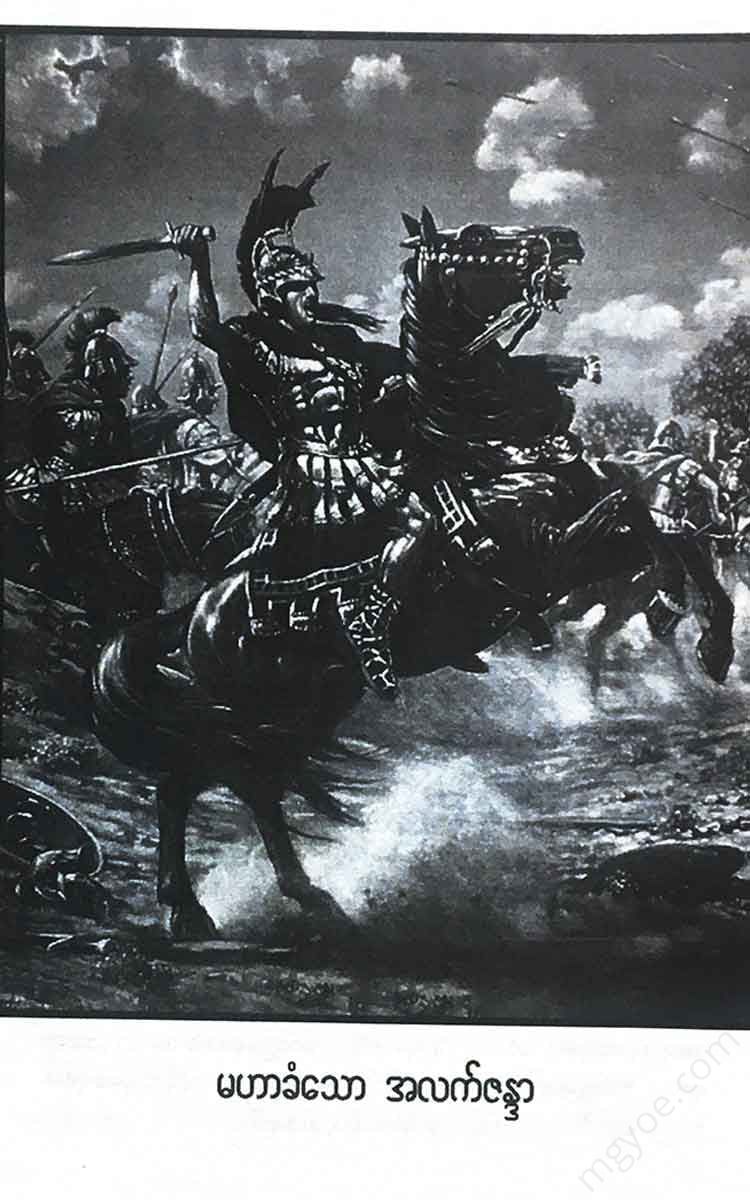Other Websites
Dr. Tin Win - Famous people who love and hate
Dr. Tin Win - Famous people who love and hate
Couldn't load pickup availability
The life story of Alexander the Great is fascinating. The subjects we studied as children were remnants of colonial-era curricula, which focused on European heroes rather than our own heroes.
Alexander was a young prince, about 14 years old, who was very talented. His father, Philip, had a horse sent to him from an eastern kingdom. He saw that no one who tried to ride it could even get into the saddle, but the horse would throw him off. The young prince asked his father if he could ride it. When his father said yes, the prince suddenly pulled the reins of the horse and turned it so that it faced east. Then he climbed into the saddle with him, pulled the reins of the horse, and rode it as he pleased. The horse was named Bucephalus. When his father Philip saw such talent, he was so delighted that he shed tears. It is said that the horse and Alexander lived together for about 20 years.
Such a story is a story that can give birth to a hero model for young people like writers. The author did not have to continue studying Alexander, but he read about him intermittently. He read well. But as he grew older, critical thoughts emerged.
The greatness of a person cannot be explained by reading his life story alone. Therefore, it is necessary to study the conditions prevailing in the surrounding region when Alexander emerged.
Macedonia and the Greek city-states
Macedonia, located in the northern part of the Greek peninsula, was a landlocked country. On the southern part of the Greek peninsula, there were prominent city-states such as Athens, Sparta, Thebes, and Corinth. These city-states were located in a flat area separated by hills and mountains, and were not closely connected. Initially, when important situations arose, the city-states would fight each other, but later they gradually became divided. During the period when the Greeks were divided and fighting each other, Macedonia, which was a landlocked and underdeveloped northern part of the Greek city-states, began to organize itself through the efforts of a leader. The leader's name was Philip, who became famous in European history as Philip of Macedonia. He was the father of the even more famous Alexander the Great.
The people of Macedonia were Aryans, who were of Greek descent. They even spoke Greek. Some of them were of Dorian blood, but they held themselves to the Greek identity. However, the Greeks looked down on the Macedonians, who were not culturally qualified, as they had been raised by the land and by their culture. “A nation that makes no slaves,” said the Greek politician Demosthenes. Demosthenes attacked both Philip and the small kingdom of Macedonia with accusations that were similar to those broadcast in the media today, and those who believed his words began to look down on Philip. Demosthenes was an orator who spoke in a reckless and uncompromising manner, Considering that he was a man of few words, he would not accept Philip's attempt to cover up his brilliance with his barefaced accusations, his accusations that were difficult to even describe.
If you think about it systematically, if Macedonia was a country that was so poor that it could not even produce good slaves, then a philosopher like Aristotle would not have emerged. Philip may have been a heavy drinker, but he was not uneducated. This can be said based on his qualities such as his good choice of people, his ability to raise his son, and his consideration of education as a political priority.
There was a reason why Deposthines was attacking Philip. While the Greek city-states were in disarray, Philip was organizing Macedonia. His ultimate goal was to create a unified Greek state. Macedonia would take the lead.
Philip, King of Macedonia
Philip is said to have paved the way for his son Alexander, who would have been his mentor and guide. If he had not been assassinated at the age of 47, he would have led the way and guided his son. The fact that Philip was a brilliant military leader is also evidenced by the fact that the teacher he chose to serve as his son's tutor was Aristotle. Aristotle was the son of Philip's court physician.
Philip would have discussed many matters with Aristophanes, the founder of the Lyceum in Athens, Greece, and the education of his son. It is likely that the ideas of Aristotle, who greatly influenced Alexander's early actions, were among the topics he discussed with Philip. Philip first united the isolated tribal areas surrounding Macedonia with Macedonia through military conquest.
Philip ascended the throne in 359 BC. He was king for three years and fathered Alexander. Alexander was assassinated at the age of 20, so he reigned for 23 years. He did not choose Aristotle to be his son Alexander's elder brother. Isocrates also approached Philip because Isocrates was a member of a powerful political party in Greece. That party was the Pan-Hellenic Party. Isocrates was the leading author of the party's programs. The word Hellenic was a general term for all Greeks.
Most of Athens opposed Philip. The Athenians had prospered through trade. They had originally been invaded by the Persians. Other Greek city-states, especially the Spartans, had escaped Persian rule thanks to the sacrifices of their patriots, led by Leonidas. Later, a naval alliance of Greeks led by Athens was formed to protect them from the Persians, but the dominance of Athens weakened the unity of the Greek city-states. Only then did a northern king like Philip become motivated to try to unite the Hellenists.
Philip conquered Athens in 338 BC, which was trying to make peace with the Persians. After conquering Athens, Philip not only made peace but also showed great mercy to the Athenians. Philip and his son Alexios















